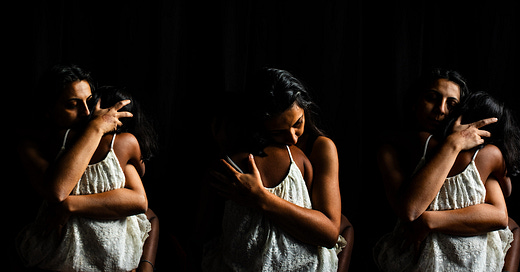I’ve never been good at opening up myself. I don’t know why. I hold back even when I am with the people who love me the most. When I met Samira, it hit me how personal and honest she is with herself. She taught me the lesson of introspection in the most gentle way.
Tell us about yourself and what's on top of your mind.
I have always liked telling stories. When I lacked an audience, I would dream of stories in my head and sometimes draw or act them out. As a child, I preferred playing alone and found the politics of team games stressful and intimidating. Growing up as a younger cousin in a group of eleven children, I did not have the authority to decide on the rules or the type of games we played.
I grew up in a large family under a patriarch, and my way of seeing the world was informed through the lens of gender roles and power play. This impacted most of my youth, leading to bad decisions and toxic relationships. It is only now that I have begun to understand the impact my childhood environment has had on my sense of self. I am beginning to unravel my own life story in an attempt to understand my biases, triggers and deep-seated conditioning.
I am currently working on Naqab, a personal project exploring the many masks I wear as an Indian woman, which emerged from this journey of self-exploration. It is a one-year-long project where I combine photography, video, art direction and writing to create visuals of the masks I have worn and continue to wear. I hope to exhibit my work at the end of this year.
How do you feel at this moment in life?
I have good days and bad – mornings where I wake up doubting myself, my writing skills, and the direction my life is headed. On other days, I remind myself that my lack of self-worth comes from years of childhood neglect and being misunderstood by my family. It takes a lot of effort to see the good in myself – things worth applauding and appreciating.But I am mindful of this way of thinking and fight it on a daily basis.
What is the biggest lesson you’ve learned from your parents?
Life is not meant to give you what you need when you need it. You need to work for it without fear of failure.
What have you experienced that has changed the way you live?
I have experienced sexual abuse and trauma at a very young age. This has shaped the narrative of my life in many ways. I now want to live in a safe space, surrounded by people I love and trust and create a world for my daughter where she is free from the burdens of my past.
I don’t want to run towards goals, living a life that constantly demands that I produce. Because that is not what I want for my daughter. Her birth was a life-changing moment for me, and my effort to fight my childhood demons, get fit and healthy and live a more balanced life has all been so that she can know that there are many ways to be happy.
How do you define happiness?
Happiness is a choice. And it cannot be achieved with alarger picture in mind. It lies in the little things that happen every day. Aday lived well is happiness for me.
Who is your favorite writer, and why?
I don’t have a favourite writer or author. I love books, and different novels have impacted and shaped my thinking at different stages of my life. Reading has always been essential for me – a way to escape from the reality of the world. So, every book I have read has helped me shape a thought, reject an idea or rejoice in the sheer pleasure of the story.
Imagine this writer was standing right in front of you and you can ask one question, what would you ask?
This is something I would ask of any writer: How and where did you get the idea for your book?
Before you go, check out Naqab, a photographic exploration through the lens of an Indian woman in today’s world.
Last but not least, Zhenya.
See you next week.
p.s. I met Samira at Asian Writers Collective.








Thank you for this collaboration, Franco! And for giving me the opportunity to think about my life and answer questions that are rarely asked or thought about. It's been wonderful chatting with you on substack. I hope we stay in touch.